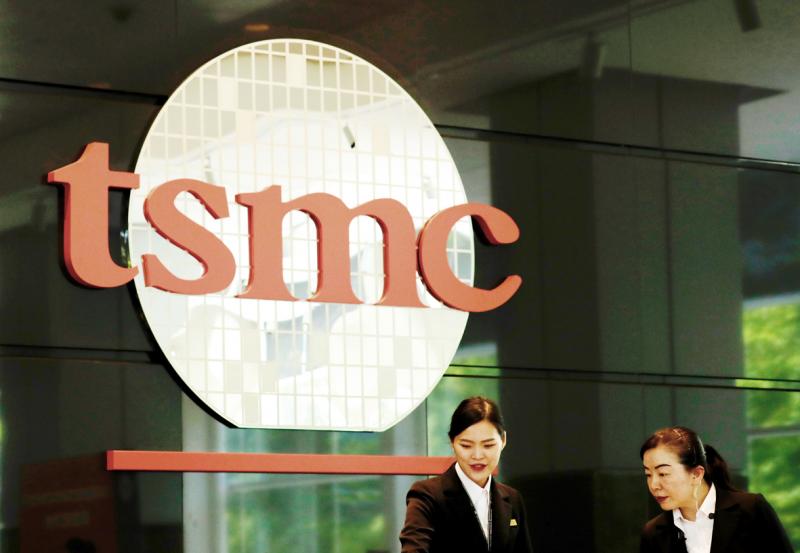Taiwan Semiconductor Manufacturing Co (TSMC, 台積電) has implemented a remote work policy for employees not on production lines in an attempt to curb the spread of COVID-19, the world’s largest contract chipmaker said yesterday.
This is the first time in the Hsinchu-based company’s history that it has launched a large-scale remote work policy, joining global technology companies, such as Apple Inc and Google, that encourage employees to work from home.
The chipmaker has also asked employees to work in split shifts from this week, it said.

Photo: EPA-EFE
As the number of virus infections continues to climb worldwide, TSMC has urged employees to halt unnecessary overseas business travel by April 12, it added.
The company’s latest disease prevention measures came after a TSMC employee in Taiwan tested positive for COVID-19 last week.
TSMC did not disclose how many employees have made arrangements to telecommute.
The policy is not mandatory, only encouraged.
TSMC has more than 40,000 workers in Taiwan.
TSMC shares yesterday rebounded 4.9 percent to NT$267.5 by the close of trading in Taipei, retreating from a gain of 7.45 percent in the middle of the session.
Foreign investors bought a net 17.39 million shares, breaking 13 consecutive sessions of net outflows.
Since early this month, the stock has plunged 16 percent, Taiwan Stock Exchange data showed.
TSMC is not the only technology company that has implemented a work-from-home policy in Taiwan. Last week, flash memory chip controller supplier Phison Electronics Corp (群聯) began to encourage some of its employees to work remotely.
Contract chipmaker United Microelectronics Corp (UMC, 聯電) said in an email that it has already separated its workforce into different office areas as a precaution. UMC is prepared to take further necessary measures such as encouraging employees to work from home, depending on the development of the COVID-19.
This story has been updated since it was first published.

The New Taiwan dollar is on the verge of overtaking the yuan as Asia’s best carry-trade target given its lower risk of interest-rate and currency volatility. A strategy of borrowing the New Taiwan dollar to invest in higher-yielding alternatives has generated the second-highest return over the past month among Asian currencies behind the yuan, based on the Sharpe ratio that measures risk-adjusted relative returns. The New Taiwan dollar may soon replace its Chinese peer as the region’s favored carry trade tool, analysts say, citing Beijing’s efforts to support the yuan that can create wild swings in borrowing costs. In contrast,

Nvidia Corp’s demand for advanced packaging from Taiwan Semiconductor Manufacturing Co (TSMC, 台積電) remains strong though the kind of technology it needs is changing, Nvidia CEO Jensen Huang (黃仁勳) said yesterday, after he was asked whether the company was cutting orders. Nvidia’s most advanced artificial intelligence (AI) chip, Blackwell, consists of multiple chips glued together using a complex chip-on-wafer-on-substrate (CoWoS) advanced packaging technology offered by TSMC, Nvidia’s main contract chipmaker. “As we move into Blackwell, we will use largely CoWoS-L. Of course, we’re still manufacturing Hopper, and Hopper will use CowoS-S. We will also transition the CoWoS-S capacity to CoWos-L,” Huang said

Nvidia Corp CEO Jensen Huang (黃仁勳) is expected to miss the inauguration of US president-elect Donald Trump on Monday, bucking a trend among high-profile US technology leaders. Huang is visiting East Asia this week, as he typically does around the time of the Lunar New Year, a person familiar with the situation said. He has never previously attended a US presidential inauguration, said the person, who asked not to be identified, because the plans have not been announced. That makes Nvidia an exception among the most valuable technology companies, most of which are sending cofounders or CEOs to the event. That includes

INDUSTRY LEADER: TSMC aims to continue outperforming the industry’s growth and makes 2025 another strong growth year, chairman and CEO C.C. Wei says Taiwan Semiconductor Manufacturing Co (TSMC, 台積電), a major chip supplier to Nvidia Corp and Apple Inc, yesterday said it aims to grow revenue by about 25 percent this year, driven by robust demand for artificial intelligence (AI) chips. That means TSMC would continue to outpace the foundry industry’s 10 percent annual growth this year based on the chipmaker’s estimate. The chipmaker expects revenue from AI-related chips to double this year, extending a three-fold increase last year. The growth would quicken over the next five years at a compound annual growth rate of 45 percent, fueled by strong demand for the high-performance computing